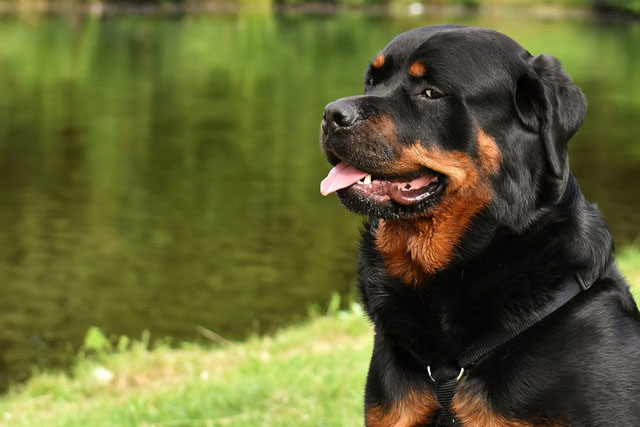



Feeding a puppy Rottweiler is crucial for their growth and development. During the first few months of their life, puppies require a specific diet to support their rapid growth and provide them with the necessary nutrients. Here are some recommended guidelines for feeding a puppy Rottweiler:
1. Choose a high-quality puppy food: Look for a puppy food that is specifically formulated for large breed puppies. These foods are designed to provide the right balance of nutrients for their growing bodies.
2. Follow the feeding instructions: The packaging of the puppy food will provide guidelines on how much to feed your Rottweiler based on their age and weight. Follow these instructions closely to ensure your puppy is getting the right amount of food.
3. Divide meals into multiple feedings: Puppies have small stomachs and need to eat smaller, more frequent meals. Divide their daily food portion into three to four meals throughout the day.
4. Monitor their weight: Keep an eye on your puppy's weight to ensure they are growing at a healthy rate. If they are gaining too much weight, reduce their food portion slightly. If they are not gaining enough weight, consult with your veterinarian.
5. Provide fresh water: Always have fresh water available for your puppy. They need to stay hydrated, especially during their active growth phase.
Feeding an adult Rottweiler requires a balanced diet to maintain their overall health and well-being. Here are some recommended guidelines for feeding an adult Rottweiler:
1. Choose a high-quality adult dog food: Look for a dog food that is specifically formulated for large breed dogs. These foods are designed to meet the nutritional needs of adult Rottweilers.
2. Determine the right portion size: The amount of food your adult Rottweiler needs will depend on their size, activity level, and metabolism. Follow the feeding guidelines on the packaging as a starting point and adjust as needed based on your dog's individual needs.
3. Feed twice a day: Divide your Rottweiler's daily food portion into two meals, one in the morning and one in the evening. This helps prevent bloating and promotes better digestion.
4. Avoid overfeeding: Rottweilers have a tendency to overeat, which can lead to obesity. Monitor your dog's weight and body condition and adjust their food portion accordingly.
5. Incorporate healthy treats: Treats can be a part of your Rottweiler's diet, but make sure they are healthy and given in moderation. Avoid giving them table scraps or high-calorie treats that can contribute to weight gain.
As Rottweilers age, their nutritional needs change. Feeding an elderly Rottweiler requires special attention to support their aging bodies. Here are some recommended guidelines for feeding an elderly Rottweiler:
1. Choose a senior dog food: Look for a dog food that is specifically formulated for senior dogs. These foods are designed to support their joint health, digestion, and overall well-being.
2. Adjust portion size: Older Rottweilers may have a slower metabolism and lower activity level, so they may require fewer calories. Adjust their food portion size accordingly to prevent weight gain.
3. Consider supplements: Talk to your veterinarian about adding supplements to your elderly Rottweiler's diet. Joint supplements, omega-3 fatty acids, and antioxidants can help support their aging bodies.
4. Monitor their weight and body condition: Keep a close eye on your elderly Rottweiler's weight and body condition. If they are losing weight or have a poor appetite, consult with your veterinarian to rule out any underlying health issues.
5. Provide easy-to-digest meals: Older Rottweilers may have a harder time digesting certain foods. Choose a dog food that is easily digestible and consider feeding smaller, more frequent meals to prevent digestive issues.
Remember, every Rottweiler is unique, and their feeding needs may vary. It's important to consult with your veterinarian to determine the best feeding guidelines for your specific puppy, adult, or elderly Rottweiler.
Related posts